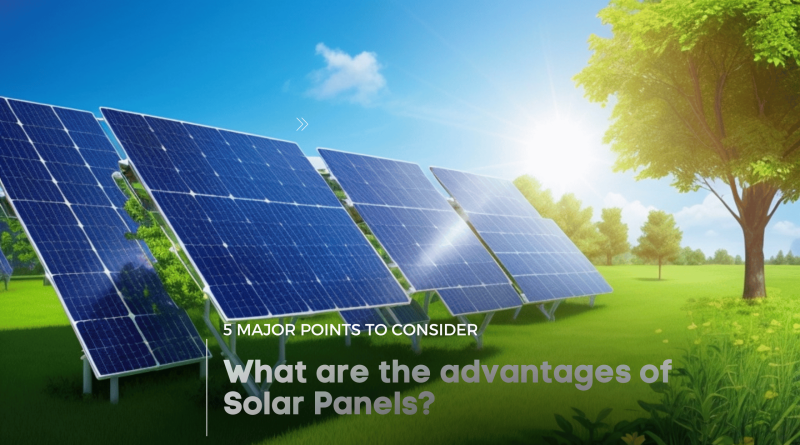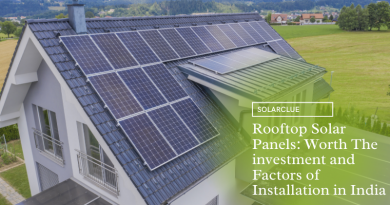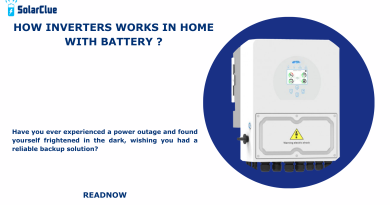What are the advantages of Solar panels?
Utilising solar energy has become a symbol of hope in a society where environmental preservation and sustainability are top priorities. Solar panels, also known as photovoltaic (PV) panels, have come to represent clean and renewable energy sources. They provide a wide range of benefits, from lowering electricity costs to promoting environmental sustainability. We’ll go further into the positive aspects of solar panels in this blog and examine why they’re a wise investment for both homeowners and businesses.
How do solar panels work?
It’s important to comprehend the fundamental concepts underlying the operation of solar panels before going further into their benefits. Numerous photovoltaic cells make up solar panels, and each of these cells converts sunlight into electricity.
1. Sunlight Absorption:Semiconductors, which are primarily silicon-based, absorb photons (light particles) from the sun.
2. Electricity Generation: Direct current (DC) electricity is produced when photons are absorbed because they activate electrons in the semiconductor material.
3. Changing Electricity Into Usable Energy: A solar panel’s DC electricity is transformed into alternating current (AC) electricity by an inverter, which then powers your home or place of business.
What are the advantages of Solar panels?
The following are the advantages of solar panels:
1. Renewable and Clean Energy
The first advantage of solar panels is the capacity of solar panels to provide clean, renewable energy is one of their most notable benefits. Solar panels generate power without emitting any damaging greenhouse gases into the atmosphere, in contrast to burning fossil fuels. They become a crucial weapon in the struggle for a cleaner planet and the averting of climate change as a result.
By reducing dependency on fossil fuels, solar panels assist in lowering carbon emissions. We become less reliant on limited and harmful energy sources as more families and companies switch to solar power.
2. Lowering electricity costs
The possibility for significant electricity bill reductions is one of the most alluring advantages for homeowners. You can create your own electricity using solar panels, which lessens your reliance on the grid. This is how it goes:
Net metering: Your solar panels’ extra electricity can often be fed back into the grid, giving you credits with your utility provider. This implies that you can use those credits at times when your solar panels aren’t generating electricity, such as at night.
Lower monthly Expenses: The biggest advantage of Solar panels for you is to use less electricity from the grid when you generate it, which results in cheaper monthly rates. These savings can add up to a lot over time.
One of the most persuasive benefits of solar panels is their ability to reduce your monthly expenses. You produce your own electricity by using the sun’s energy, which considerably lessens your reliance on the conventional grid. This has measurable financial advantages.
You can receive credits from your utility provider by sending any extra electricity your solar panels generate back to the grid through net metering.When your solar panels aren’t generating electricity, such as at night or on overcast days, you apply these credits, effectively reducing your utility bills
Solar panels also offer long-term cost reductions. They frequently pay for themselves in a short amount of time and have guarantees that ensure their performance for decades. Your set energy expenses remain consistent despite the rising energy prices, shielding you from potential price increases.
3. Environmentally Friendly
In addition to being clean, solar panels are also environmentally good in other ways.
Water conservation: Coal and natural gas are two common fuels for traditional power generation, both of which need a lot of water to cool. In areas where there is a shortage of water, solar panels are a sustainable option because they do not need this.
Reduce greenhouse gas emissions: The utilisation of solar power is essential for lowering greenhouse gas emissions. They help reduce carbon dioxide (CO2) emissions, which is important for battling global warming, by producing power without burning fossil fuels.
4. Lower Maintenance
Cleaning: You can clean the system once in a while to eliminate dust and dirt accumulation, ensuring optimal operation. Rain often naturally handles this, but in desert areas, manual cleaning may be necessary.
Inspections: Professional checks on a regular basis guarantee that your solar panels are operating at their best. Any problems may be discovered and resolved quickly.
5. Energy Independence
You can become somewhat energy-independent with the help of solar panels. Several situations make this especially advantageous:
Power Outages: You may have a dependable supply of electricity during power outrages with solar panels and battery storage, ensuring that your vital appliances continue to run.
Remote Locations: For residences and businesses in outlying locations where obtaining grid access might be costly or difficult, solar panels are a realistic choice.
The Future of Solar Energy
The advantages of Solar panels are not only for today but it is for the future too. Solar power has an incredibly bright future. Their effectiveness and affordability continue to rise as a result of technological developments in solar panel design and production. Consider the following trends:
Improved Efficiency: Ongoing research attempts to increase solar panels’ effectiveness, making them even more efficient and economical.
Energy storage solutions: With the development of batteries and energy storage technology, it is now possible for businesses and homeowners to store extra solar energy for later use, boosting self-sufficiency.
Design Innovation: The attraction of solar panels is increasing as a result of new designs that effortlessly blend into existing architectural features.
Broader Adoption: Solar panels are anticipated to become more and more important as the globe moves towards environmentally friendly energy sources.
Using Solar panels to capture the Sunlight
Take advantage of solar energy’s advantages and start your journey to a cleaner future with Solarclue! Our team of experts specialises in designing and installing solar panel systems that are specifically catered to your needs. We’re here to assist you in using solar energy so that you can save money, lessen your carbon impact, and use less electricity.
Get the site survey today https://www.solarclue.com/survey
Conclusion
Solar energy systems are an effective tool for building a sustainable and clean energy future and are not merely a way to produce electricity. You may help create a cleaner environment, reduce your electricity costs, and achieve energy independence by deciding to use solar power. The benefits are obvious, and the future seems promising. Let’s go out on this solar-powered trip together from Solarclue. It’s time to enjoy the sun and change the world for the better.
Solar panels generate clean and renewable energy, reducing dependence on fossil fuels and lowering carbon emissions, contributing to a healthier environment.
By harnessing sunlight to generate electricity, solar panels can significantly lower or eliminate electricity bills, providing long-term cost savings.
Solar panels can be installed on various roof types, but factors like roof orientation, shading, and structural integrity should be considered.
While solar panels are most effective in direct sunlight, they can still generate power on cloudy days or in areas with less sunlight, albeit at reduced efficiency.
Solar panels typically have a lifespan of 25-30 years and require minimal maintenance. Regular cleaning and occasional checks ensure optimal performance.
Homes with solar installations are often perceived as more energy-efficient, leading to increased property value and market appeal.
Yes, solar panels allow homeowners to generate their own electricity, reducing dependence on external power sources and enhancing energy independence.
Many governments offer incentives, such as tax credits or rebates, to encourage the adoption of solar energy and promote sustainability.
Solar panels are designed to withstand various weather conditions, including storms. While snow may temporarily reduce efficiency, panels are generally durable.
Yes, solar thermal systems can be employed for heating water, and solar-powered air conditioning systems are available for cooling, providing a comprehensive energy solution.




